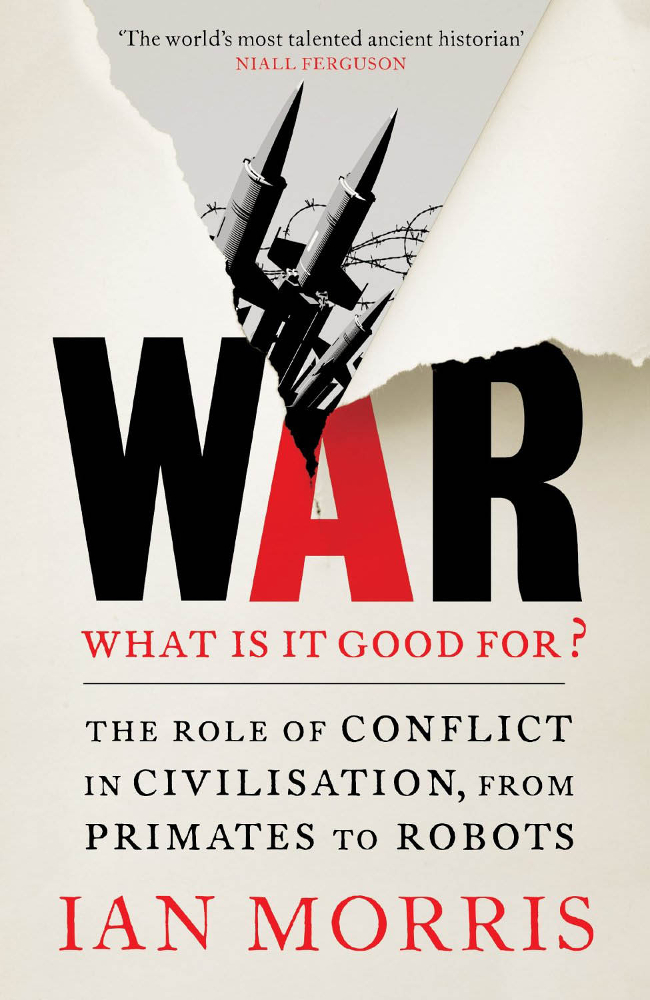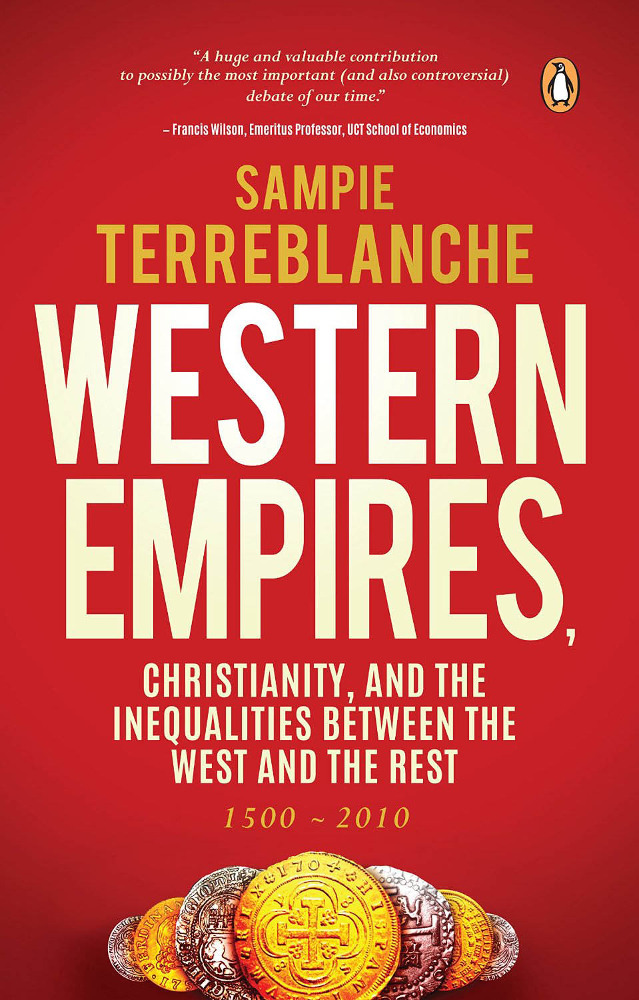Three new books explore the topic of conflict and how it has shaped the world as we know it.
- WAR: WHAT IS IT GOOD FOR? THE ROLE OF CONFLICT IN CIVILISATION, FROM PRIMATES TO ROBOTS by Ian Morris (Profile)
- WESTERN EMPIRES, CHRISTIANITY AND THE INEQUALITIES BETWEEN THE WEST AND THE REST 1500-2010 by Sampie Terreblanche (Penguin)
- SOUTH AFRICA: THE PRESENT AS HISTORY, FROM MRS PLES TO MANDELA AND MARIKANA by John S Saul and Patrick Bond (Jacana)
Ian Morris takes his title and generative question from the old protest song – “War! What is it good for?” – but comes up with an answer different to the song’s (which is “Absolutely nothing!”).
War, says Morris, can be good for something: it’s productive if considered in the long term, and he doesn’t mean only “just wars” such as the world war against Nazism. Using long-term data that has popped up elsewhere (notably in The Better Angels of Our Nature by Steven Pinker), he argues that, overall, human wellbeing has improved over the centuries. Even in an era of industrialised warfare, a smaller proportion of society is destroyed by war than was the case in the time of small-scale tribal warfare – by one or two percentage points.
To sustain his argument, however, Morris has to resort to two fudges. First, he has to make a distinction between “productive” and “counterproductive” wars, because not all the wars he talks about do lead to longer-term improvements in wellbeing. Wars that cause ongoing social and national fragmentation are counterproductive, whereas wars that lead to consolidation of territory and state building are productive. Following sociologist Charles Tilly, he sees that war makes the state, and that (à la Francis Fukuyama) conquest turns roaming bandits into “stationary bandits”, who then become the state. Which brings us to the second fudge.
What Morris is really talking about is imperialism. Most of his “productive” wars are wars of conquest, in which conquerors, such as the Romans, violently took over swaths of territory and imposed their rule – the Pax Romana. Once the “initial bloodletting” was over, peace and the rule of law was imposed, and the conquerors built roads and other infrastructure, allowing trade and thus development to flourish, leading ultimately to greater wellbeing overall.
He draws parallels with later empires such as the British one, arguing (as Niall Ferguson did in Empire) that, in the end, such imperial conquests drove economic development and thus benefited those societies as a whole. He’s also keen to point out (again, with Ferguson) that, of the European empires, the Pax Brittanica was ultimately the least harmful to the colonised. Bully for them.
He does not, though, compare the British colonies with the worst of the other European conquests, which would bolster his argument in one way and vitiate it in another. The strongest countercase would be that of the Leopoldine and Belgian Congo, where the massacres of the colonial era are horribly echoed by the more than five million who have died in the post-Mobutu conflicts. And there’s no end in sight. All that war, but still no functional state?
Morris’s earlier book, Why the West Rules – for Now, was much more compelling than War: What Is It Good for? He is a readable writer, with a talent for catchy conceptual formulations and neat summations, but in this book his argument often feels strained and his conclusions questionable. Sampie Terreblanche would certainly dispute them, for his Western Empires is a sustained (600 pages) account of how modern empires formed what Immanuel Wallerstein calls the present “world system”. The West certainly benefited from the exploitation of its colonies, and continues to benefit, but only the coldest of gross domestic product-per-capita statistics show a long-term improvement in the lives of the exploited.

The Roman Empire was built on slavery, as was the growth of the European empires in the 1600s, 1700s and 1800s. Mining in Africa (especially South Africa) led to the forced proletarialisation of indigenes, and they were then exploited by being paid the tiniest possible wage. British colonialism in India destroyed nascent local industry, killing off internally driven development, and millions died in famines. Surely his calculus of wellbeing should in some way factor in all this exploitation and suffering, but it doesn’t.
Focusing on what Morris glosses over, Terreblanche traces the development of empire from the first European conquest of non-European lands (the Spanish empire in South America), through the early forms of globalisation driven by the British empire and its sea power, to the present-day “American-led” empire that goes for economic domination and exploitation without the actual occupation of territory.
(The Iraq war, however, showed how a temporary occupation was necessary to further American economic aims. If that was, in Morris’s terms, a “counterproductive war”, leaving Iraq in chaos and causing its people’s wellbeing to drop precipitately, could it be because the occupation wasn’t permanent?) Terreblanche provides the long history of exploitation, buttressed by heaps of detail. He sees Christianity as central to European empire-building, for it gave Europeans an alleged moral purpose in its wars of conquest, as well as a sense of collective identity, an identity that then defined itself against the “other” – the conquered colonial subject.
It’s not mentioned in Terreblanche’s bibliography, but Tzvetan Todorov’s smallish book, The Conquest of America, for all its blandly neutral title, is a brilliant and terrifying account of how this “othering” worked and how it validated the most awful depredations. Ideological Christianity may have been replaced, later in the story of empire, by notions such as civilisational (or “cultural”) superiority, “manifest destiny” and “democracy”, but the dynamic is the same.

Continuing and developing this imperial story as it played out in South Africa specifically, John S Saul and Patrick Bond’s book feels as though it could be folded almost seamlessly into Terreblanche’s narrative. Just as the Dutch East India Company and the British equivalent were foundational forms of shareholder capitalism, their entry into Southern Africa set the basic paradigm of colonial mastery and exploitation, which still structures South Africa today.
Saul and Bond divide the book between them, with Saul taking the reader “from Mrs Ples” to the transition of the early 1990s, and Bond moving from there to Marikana (though Saul does the concluding chapter, on resisting “recolonisation”). Well, it only takes a chapter to get from Mrs Ples to 1970, and Saul draws deeply on the earlier histories of Leonard Thompson and JD Omer-Cooper for the basic trajectory.
For me, the most interesting and illuminating parts of South Africa: The Present as History are Saul’s consideration of the demobilisation of popular politics after 1994 and the self-dissolution of the United Democratic Front, and Bond’s study of how the ANC in power went fully neoliberal, dropping the apparent social-democratic aims of the mid-1990s, and devoting itself to elite formation.
To end, they quote Terreblanche, from his earlier Lost in Transformation (2012), on the “co-option of South Africa as a satellite of the American-led neoliberal empire”, and his view that in all likelihood “the downward spiral of [poverty, unemployment and inequality] will be perpetuated for at least another decade or two”. It’s easy to share Terreblanche’s pessimism, they say, but prefer to reframe it as a kind of leftist optimism, quoting the late Neville Alexander’s belief that “we are standing on the threshold of a politics that will be shaped by a heightened sense of class struggle”.
More class struggle? That may not seem very hopeful to everyone, except perhaps in the very long term and within a Marxist paradigm. Saul and Bond’s work hasn’t the literary verve of Morris’s, but they write with a vigour that animates their arguments and hopefully takes their book beyond the academic ghetto. It should be read by anyone interested in the story of South Africa and empire, never mind its present, as should Terreblanche’s tome on modern imperialism.
Western Empires is probably the most historically comprehensive all-in-one book on the subject to be found in bookshops today, but unfortunately it’s the least easy to read of those under review. Its style is plodding and often repetitive, notwithstanding the insistent internal cross-referencing by number that can make a page of it look like a legal disquisition.
Terreblanche loves acronyms and neologisms. He quotes liberally from other sources, but can’t resist interpolating his own terms into those quotes, in many a set of square brackets, and he certainly never tires of typing the words “emphasis added”. Emphasis added, indeed.